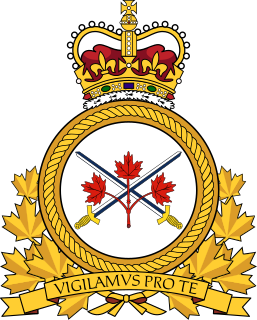
Lieutenant-General Roméo Antonius Dallaire, is a Canadian humanitarian, author and retired senator and general. Dallaire served as Force Commander of UNAMIR, the ill-fated United Nations peacekeeping force for Rwanda between 1993 and 1994, and attempted to stop the genocide that was being waged by Hutu extremists against the Tutsi people and Hutu moderates.
![United Nations Assistance Mission for Rwanda Failed UN Mission to mediate peace in Rwanda leading up to the [[Rwandan genocide]]](https://upload.wikimedia.org/wikipedia/commons/thumb/5/52/Emblem_of_the_United_Nations.svg/320px-Emblem_of_the_United_Nations.svg.png)
The United Nations Assistance Mission for Rwanda (UNAMIR) was established by United Nations Security Council Resolution 872 on 5 October 1993. It was intended to assist in the implementation of the Arusha Accords, signed on 4 August 1993, which was meant to end the Rwandan Civil War. The mission lasted from October 1993 to March 1996. Its activities were meant to aid the peace process between the Hutu-dominated Rwandese government and the Tutsi-dominated rebel Rwandan Patriotic Front (RPF). The UNAMIR has received much attention for its role in failing, due to the limitations of its rules of engagement, to prevent the Rwandan genocide and outbreak of fighting. Its mandate extended past the RPF overthrow of the government and into the Great Lakes refugee crisis. The mission is thus regarded as a major failure.
Psychological trauma is a type of damage to the mind that occurs as a result of a distressing event. Trauma is often the result of an overwhelming amount of stress that exceeds one's ability to cope, or integrate the emotions involved with that experience. Trauma may result from a single distressing experience or recurring events of being overwhelmed that can be precipitated in weeks, years, or even decades as the person struggles to cope with the immediate circumstances, eventually leading to serious, long-term negative consequences.

Combat stress reaction (CSR) is a term used within the military to describe acute behavioral disorganization seen by medical personnel as a direct result of the trauma of war. Also known as "combat fatigue" or "battle neurosis", it has some overlap with the diagnosis of acute stress reaction used in civilian psychiatry. It is historically linked to shell shock and can sometimes precurse post-traumatic stress disorder.

This article details the role of the international community in the Rwandan genocide.
Major-General Guy Tousignant, CMM, CD is a Canadian soldier.
An employee assistance program (EAP) is an employee benefit program that assists employees with personal problems and/or work-related problems that may impact their job performance, health, mental and emotional well-being. EAPs generally offer free and confidential assessments, short-term counseling, referrals, and follow-up services for employees and their household members. EAP counselors also work in a consultative role with managers and supervisors to address employee and organizational challenges and needs. Many corporations, academic institution and/or government agencies are active in helping organizations prevent and cope with workplace violence, trauma, and other emergency response situations. There is a variety of support programs offered for employees. Even though EAPs are mainly aimed at work-related problems, there are a variety of programs that can assist with problems outside of the workplace. EAPs have grown over the years, and are more desirable economically and socially.
Betrayal is the breaking or violation of a presumptive contract, trust, or confidence that produces moral and psychological conflict within a relationship amongst individuals, between organizations or between individuals and organizations. Often betrayal is the act of supporting a rival group, or it is a complete break from previously decided upon or presumed norms by one party from the others. Someone who betrays others is commonly called a traitor or betrayer. Betrayal is also a commonly used literary element, also used in other fiction like films and TV series, and is often associated with or used as a plot twist.
Peer support occurs when people provide knowledge, experience, emotional, social or practical help to each other. It commonly refers to an initiative consisting of trained supporters, and can take a number of forms such as peer mentoring, reflective listening, or counseling. Peer support is also used to refer to initiatives where colleagues, members of self-help organizations and others meet, in person or online, as equals to give each other connection and support on a reciprocal basis.
Critical incident stress management (CISM) is an adaptive, short-term psychological helping-process that focuses solely on an immediate and identifiable problem. It can include pre-incident preparedness to acute crisis management to post-crisis follow-up. Its purpose is to enable people to return to their daily routine more quickly and with less likelihood of experiencing post-traumatic stress disorder (PTSD). Evidence-based reviews, however, have concluded that CISM is ineffective for primary trauma victims, and should only be used for secondary victims, such as responding emergency services personnel. CISM was never intended to treat primary victims of trauma.
As defined by the United States Department of Veterans Affairs, military sexual trauma (MST) are experiences of sexual assault, or repeated threatening sexual harassment that occurred while a person was in the United States Armed Forces.
Military psychology is the research, design, and application of psychological theories and empirical data towards understanding, predicting, and countering behaviours in friendly and enemy forces, or in civilian populations. There is particular emphasis on behaviours that may be undesirable, threatening, or potentially dangerous to the conduct of military operations. Military psychology utilizes multiple different psychology sub-disciplines to encourage resiliency among military troops and counteract enemy forces for military victories. The stressors and mental illnesses studied under military psychology are not specific to the military. However, soldiers often face unique combinations of stressors within combat and war settings, and may go on to experience stress-related psychiatric disorders. Specific examples of the issues faced by military personnel include posttraumatic stress disorder (PTSD), guilt, family and partner difficulties, and nightmares and flashbacks. Applied military psychology is especially focused on counselling, and treatment of stress and fatigue of military personnel and their families.
Stefan Steć was a major of the Polish Armed Forces. In 1994 he served as a peacekeeper in the UNAMIR-1 forces in Rwanda under general Roméo Dallaire. For his dedication in saving lives during Rwandan genocide at the risk to his own he was awarded the Cross of Merit for Bravery by Polish President Lech Wałęsa. He died at the age of 41 due to complications from posttraumatic stress disorder.

United Nations Security Council resolution 918, adopted without a vote on 17 May 1994, after reaffirming all resolutions on the situation in Rwanda, particularly resolutions 872 (1993), 909 (1994) and 912 (1994), the Council expressed its alarm and condemnation at the continuing large-scale violence, and went on to impose an arms embargo on the country and authorised an expansion of the United Nations Assistance Mission for Rwanda (UNAMIR).
The Center for Deployment Psychology (CDP) is an organization offering training for behavioral health professionals who provide mental health services unique to the experience of deployment in the United States Armed Forces for active-duty military service members, veterans and their families. CDP is headquartered at the Uniformed Services University of the Health Sciences (USUHS) in Bethesda, Maryland and is funded by the United States Department of Defense.
Trauma risk management (TRiM) is a method of secondary PTSD prevention. The TRiM process enables non-healthcare staff to monitor and manage colleagues. TRiM training provides TRiM Practitioners with a background understanding of psychological trauma and its effects.

Neil Greenberg is an academic psychiatrist, who is a specialist in the understanding and management of psychological trauma, occupational mental ill-health and post traumatic stress disorder. Neil is based at King's College London and served as the President of the UK Psychological Trauma Society from 2014-2017. He also runs the psychological health consultancy March on Stress.

Richard Allan Bryant AC is an Australian medical scientist. He is Scientia Professor of Psychology at the University of New South Wales (UNSW) and Director of the UNSW Traumatic Stress Clinic, based at UNSW and Westmead Institute for Medical Research. His main areas of research are Post Traumatic Stress Disorder (PTSD) and Prolonged Grief Disorder. On 13 June 2016 he was appointed a Companion of the Order of Australia (AC), for eminent service to medical research in the field of psychotraumatology, as a psychologist and author, to the study of Indigenous mental health, as an advisor to a range of government and international organisations, and to professional societies.





![United Nations Assistance Mission for Rwanda Failed UN Mission to mediate peace in Rwanda leading up to the [[Rwandan genocide]]](https://upload.wikimedia.org/wikipedia/commons/thumb/5/52/Emblem_of_the_United_Nations.svg/320px-Emblem_of_the_United_Nations.svg.png)




